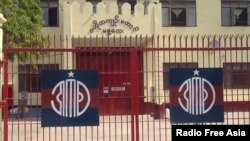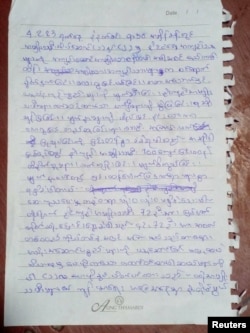In early February, four members of an anti-junta group in the Myanmar city of Mandalay said they received a secret, one-page, handwritten note spirited out of a prison that details two days of clashes and beatings of female political prisoners.
The note, received by the "Anti-Junta Forces Coordination Committee - Mandalay" and since seen by Reuters, provides the first detailed account of a crackdown on defiant female prisoners inside Mandalay's Obo prison that left scores of women injured, according to six activists and lawyers who work with political prisoners.
Two family members of prison inmates contacted the anti-junta group after being told by prison authorities that they couldn't send food and packages to relatives, the four anti-junta group members said.
The group started looking into the matter and, within days, received the note, the four members said.
Two lawyers, two family members of inmates and the human rights minister from Myanmar's exiled parallel civilian government confirmed the information contained in the note. Reuters could not independently verify the authenticity of the note or the details it contains.
A spokesman for Myanmar's military government that has ruled since seizing power in 2021 and two prison department officers did not answer repeated calls over two days from Reuters seeking comment.
The junta has previously denied holding political prisoners, saying people in jail broke the law and were sentenced after due legal process. Human rights organizations have frequently criticized the hearings as kangaroo courts.
Inside the prison, which rights activists say houses some 2,000 political inmates including 330 women, an altercation between an inmate and a prison official on Feb. 3 led to around 150 male prison guards arriving with slingshots, batons and bamboo sticks, the note, written in Burmese, said.
"During that incident, more than 100 female political prisoners were seriously injured including a broken arm, eye injuries and facial bruises," the note said.
The following day, some female prisoners and prison guards faced off again, leading to another bout of violent clashes, according to the note and the lawyers, activists and family members who spoke to Reuters. They said they obtained the information from around a dozen people, including prison wardens, medical staff and inmates.
Serious injuries
All four activists declined to reveal exactly how the note was smuggled out, citing risk to individuals involved in the process and fearful that such routes to leak information from inside the prison may be blocked by authorities.
The activists and lawyers said the note, and the details of the clashes on Feb. 3-4 they pieced together from conversations with prison staff and others, afforded a rare insight into what they described as harsh conditions faced by thousands of prisoners across Myanmar under military rule, including women, who are often given limited food and medicines.
The activists, lawyers and family members interviewed by Reuters asked not to be identified for fear of repercussions as they are working inside Myanmar.
In the second week of February, the parallel civilian government said in a social media post that 150 male guards at Obo prison had "violently beaten up" women inmates, supporting the version of events that the activists, lawyers and family members separately provided to Reuters.
Of the 100 female inmates injured in the clashes, all aged between 20 and 35, 21 were seriously injured, including six who were hit in the head, according to activists and lawyers. The smuggled note did not specify injuries or provide such detailed figures.
Myanmar's jails were inundated by new prisoners in 2021 after the junta seized power from the elected government led by Nobel laureate Aung San Suu Kyi, triggering a wave of protests that has morphed into a guerrilla resistance movement.
Accused by local and international rights activists of rampant abuses in its response, the junta has said that it has a duty to ensure peace and security, and that it is carrying out a legitimate campaign against “terrorists”.
The junta has imprisoned around 16,000 people, more than 3,000 of them women, as of Feb. 28, according to the non-profit Assistance Association for Political Prisoners.
'They used men' to guard women
Aung Myo Min, the human rights minister in Myanmar's exiled parallel civilian government, said Obo prison authorities had violated prison rules by using male guards to handle female inmates.
"As these people are women prisoners, they have to be handled by women prison guards. But they used men,” he told Reuters, echoing similar allegations made separately by activists and lawyers.
Male guards cannot enter dormitories housing female inmates without the presence of women guards and female inmates cannot be physically beaten, according to a copy of a nationwide prison rule book published in 1992 seen by Reuters.
Reuters could not independently verify if there were any female guards present during the incidents on Feb. 3-4 or if the rule book remains current.
"They used excessive force," Aung Myo Min said, adding that his ministry had investigated the violence at Obo prison. He declined to explain how the investigation was conducted and offered no evidence to support the allegation.
The anti-junta group and two Mandalay-based lawyers who work with political prisoners said those involved in the violence were also denied medical care.
"They refused to give medicines to the injured prisoners after beating them severely. We had to use under-the-table methods to be able to send medicine," one lawyer said. Reuters could not independently verify that information.
After the violence, 72 female political prisoners were isolated from other inmates at Obo and dozens were transferred to other jails without their families being notified, according to three activists, two lawyers and two family members.






